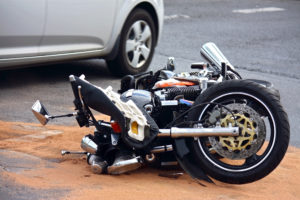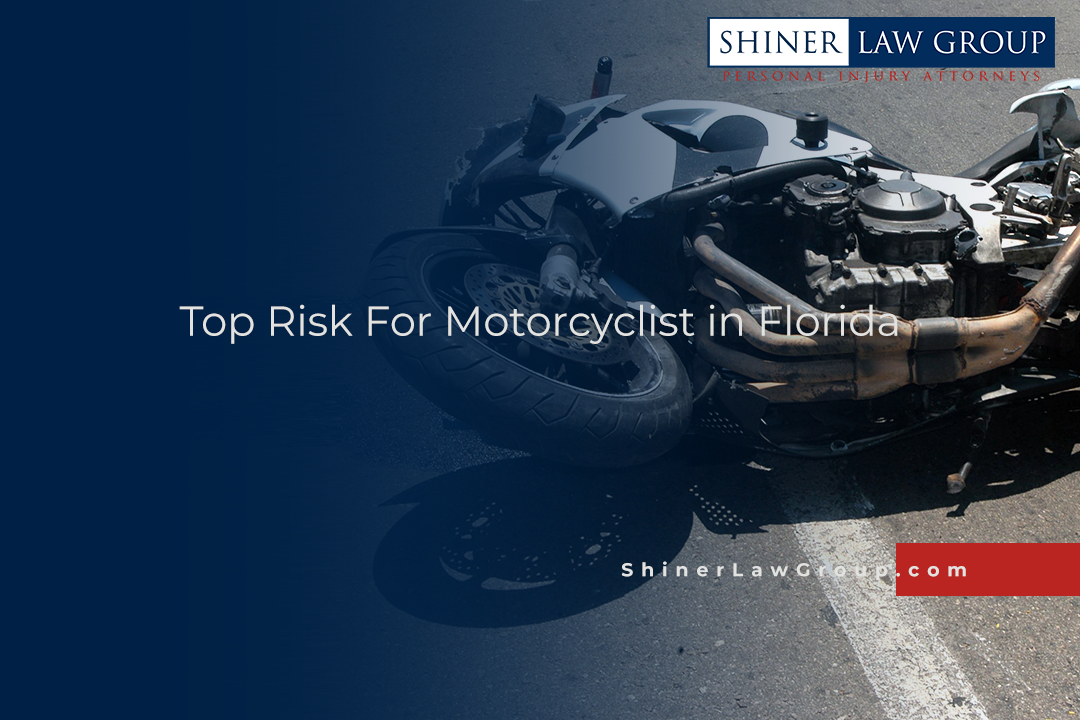Florida is blessed with perfect weather for most of the year. Combine that with its large population plus the high tourist volume, and you get the ideal conditions for motorcycle ownership.

The Sunshine State now has approximately 600,000 registered motorcycles, the second-largest when compared to all other states. Such high numbers and the fact that the law exempts individuals above 20 from wearing a helmet have put Florida among the riskiest bike riding states.
Hazards That are Responsible for Motorcycle Accidents
There are many reasons why bike accidents occur out of the blue. Our team at Shiner Law group has compiled the top 5 plausible risks that can put your life in jeopardy.
1. Faulty Motorcycle Parts
After an accident, people are usually quick to point the blame at the other driver involved, if any. The culprit could as well be the manufacturing or assembly company that handled the motorcycle production. Some motorcycle parts might be defective, causing the rider to lose control and veer off the road.
Other times, the bike might have gone too long without servicing, causing seemingly small issues to get worse over time. If an important part loses its function due to this, the chances of an accident increase greatly.
2. Negligent Road Users
There’s no shortage of people who blatantly ignore traffic rules simply because they’ve never been in an accident. From doing seemingly harmless things like tailgating (following another driver too closely) to changing highway lanes at high speeds, reckless drivers increase the chances of collision ten-fold.
Bike riders are at a higher risk of falling victim to this since they operate on less stable vehicles. Larger vehicles are also less likely to spot an oncoming motorcycle, especially when the rider is in a blindspot.
3. Hazardous Road Conditions
It’s no question that Florida’s lanes are scenic and the best-kept roads in the country. However, that doesn’t mean that there aren’t areas of imperfection like uneven roads. Most people drive carefree and aren’t usually prepared when they hit these snags.
They may end up losing their balance and falling off their bike. This results in serious injuries like multiple fractures, spinal cord, and brain injuries.
4. Driving Under the Influence
This covers alcohol and other drugs. It’s dangerous for the intoxicated driver and anyone else using the road, including motorists. Motorists themselves should also avoid drunk driving even if they feel like it’s harder for the law to catch up with them.
5. Distracted Driving
As a motorist, your hands will probably be on the handlebars most of the time you’re on the road. Over the years, it’s become possible to operate tech hands-free when doing tasks like picking calls.
A lot of people think that this option is safe. Remember, your attention will still be divided as your brain is juggling more than one task at once. Even talking to your passenger and listening to music on the go counts as distracted driving.
Other road users might also be doing the same as they go about their business. All these factors create the perfect scenario for road accidents, given that they reduce your reaction time and that of others.

Injuries Caused by Motorcycle Accidents
A lot of riders usually have most of their body exposed when traveling. This causes many injuries caused by accidents to be on the severe to fatal scale. Some of the most common injuries are:
- Lacerations
- Dislocations, e.g. the jaw
- Broken ones, e.g. arms, legs, cheekbones
- Soft tissue injuries like neck injuries
- Internal bleeding
- Skull fractures
- Paralysis and other permanent disabilities
How to Avoid Motorcycle Accidents
We’ve seen that motorcycle accidents are scary and, even worse, deadly. Here are measures you can take to stay safe so you can live to ride another day.
1. Stay Prepared and Vigilant
Always make sure your bike is in prime condition before you take it out for a ride. Check that the tires aren’t excessively worn out and that all parts are working as they should. That goes for your lights, brakes, and turn signals.
On the road, you’ll want to be on the lookout for other motorists. They have been trained to be mindful of you, but you can never be sure who’s looking out for you.
For example, you should keep a lookout for signs that vehicles near you want to turn. Also, be aware that your bike can easily slip into a vehicle’s blind spot. It’s up to you to avoid those blind spots. If you can’t see the driver in the mirror, they can’t see you either.
Ensure you can handle your bike properly in tense situations where you need to make split-second decisions. Take riding lessons if you can or practice getting better by riding more. This will allow you to get a ‘sixth bike sense’ that might determine whether you live or die in a potential accident.
2. Follow the Riding Laws
Florida has its fair share of riding laws aimed at preventing motorists from crashing. Here are some paraphrased laws:
- Lane splitting is illegal. You’re not allowed to overtake and ride in the same lane as the vehicle that you’ve overtaken. [Section 316.209(2)]
- You’re not allowed to operate your bike between traffic lanes or to weave between vehicle rows. [Section 316.209(3)]
- Speed competition on any lane, highway, or parking lot is prohibited. This includes drag races, endurance, and acceleration contests. [Section 316.191(2)(a)]
- Carrying items that prevent you from having both hands on the handlebars isn’t allowed. It doesn’t matter how small the bundle is as long as it keeps one of your hands full. [Section 316.2085(4)]
- It’s possible to overtake a vehicle on the right where the law allows. However, you can’t overtake on the left or by driving off the pavement.
3. Wear Protective Gear and Clothing
It can be tempting to wear the lightest clothes you have in the open Florida heat so you don’t bake in the sun. We’ve prepared a guideline on what you can and can’t wear on a bike for your safety.
- Don’t wear loose clothes. Most motorcyclists you see on the road and in movies wear some sort of tight clothes. As stylish as they usually are, they are also much safer than loose clothes. Loose items can be quite distracting since they usually billow every which way.
- Wear a brand new helmet that you personally bought. A helmet is a worthy investment since it protects from potentially traumatizing brain injuries. An expired one or one that isn’t certified can offer little to no protection in case of an accident.
- Wear the right clothing or reflectors where possible. You might have already noticed that most bike gear is usually dark. This makes it hard for other drivers to notice you during the night especially. Get a reflector jacket or stick some reflector tape on your bike to increase your chances of other road users noticing you.
- Avoid sandals and shorts. You place your feet and legs just next to the insanely hot engine and exhaust pipes when riding. Having a good pair of boots and some long pants on you might save your legs from getting burnt in case you slip.
- Lose the heavy backpack. It’s best to put anything you’re carrying on the bike’s carrier. Having it on your back makes it easier for you to lose your balance. This advice also goes for your passenger.
4. Keep a Look Out for the Weather
Bad weather can ruin any good road. Rainy days might lead to the roads losing some of the friction they offer. Thus, the wheels get less grip on the road, making it easy for riders to veer off the road. The rain also decreases road visibility, at night especially.
Another element, wind can be just as damaging. Strong wind can push your bike from side to side depending on its strength. If you don’t have proper handling, you’ll lose control and crash. Try to drive in conducive conditions for your safety.
5. Operate at the Speed Limit
It’s good to note that fun doesn’t equal speed when it comes to motorcycles. You can still ride at a safe speed and have the time of your life. If you live for the thrill of high speeds, you can visit special parks that allow motorcyclists to drive super fast. You can also ride on roads that have many turns and changes in elevation to get your dopamine going.
What Legal Action Should You Take After a Motorcycle Accident?
If your loved one, unfortunately, passes away in an accident, you or other family members might be allowed to open an estate. The executor (representative) of the estate might then start the process of getting compensation for psychological and emotional distress brought about by the unexpected death.
For non-fatal accidents, you might be able to recover monetary compensation for inconvenience, pain, medical bills, and emotional distress caused by the crash.
If you sustain any injuries in a motorcycle accident due to someone else’s error, you can contact our skilled lawyers at Shiner Law Group to get compensation. Apart from having almost two decades of experience, we offer free initial consultations to help you get started on your case.
Our motorcycle accident lawyers are expert negotiators when it comes to large insurance companies. If the company denies you a fair settlement, we will be glad to take your case to court. Feel free to book a free consultation with a specialized motorcycle accident attorney today.

Motorcycle Accident Attorney, David Shiner
If you suffered serious injuries in a motorcycle accident, do not try to handle it by yourself. You may struggle to get the at-fault parties insurance company to take you seriously or even ultimately miss out on some or all of the compensation for which you qualify to recover. A motorcycle accident attorney can help ensure that you understand the true value of your claim and fight to help you obtain it following your motorcycle accident.
